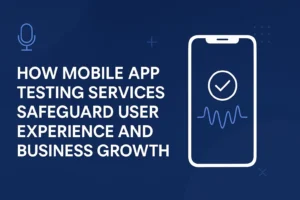How Mobile App Testing Services Safeguard User Experience and Business Growth

Transcript
Welcome to the Testers HUB Podcast. I’m your host, Vijay, and in today’s episode, we’ll explore why mobile app testing services are essential for delivering smooth user experiences and protecting business growth.
We’ll look at four areas: the mobile app market, the risks of neglecting testing, real-world case studies, and finally, how structured QA adds long-term value.
Section 1 – The Mobile App Market and the Stakes of Quality
Mobile applications dominate how users shop, bank, learn, and communicate. With more than five million apps across iOS and Android, competition is fierce. If one app fails, users immediately switch to another.
Research shows that 80% of users uninstall an app within the first three uses if they encounter problems. Even small issues like delays, broken navigation, or failed transactions can trigger abandonment.
Negative reviews also reduce app store visibility, further hurting downloads. Conversely, apps that work reliably earn loyalty, higher ratings, and more revenue. This makes professional mobile app testing not just helpful but essential for every business.
Section 2 – Risks and Challenges Without QA
Companies often test only on a few devices or simulators, leaving blind spots. Some key risks include:
- Device Fragmentation: Thousands of Android models exist. Features may break on mid-range or older devices.
- Network Issues: Apps behave differently on Wi-Fi versus mobile data. Switching between them often causes failures.
- Performance Problems: Battery drain, overheating, and lag push users away.
- Security Gaps: Weak encryption or authentication risks breaches.
- Payment Failures: Even one broken checkout equals lost revenue.
- Accessibility Gaps: Poor design excludes users and violates compliance standards.
Fixing such issues post-launch is far more expensive than addressing them during QA. Testing early and thoroughly avoids these pitfalls.
Section 3 – Case Studies in Mobile QA
Healthcare App:
We tested a healthcare iOS app where appointment booking failed on older iPhones. Fixing this before launch ensured patient trust and smooth adoption.
E-Commerce Startup:
Load testing an eCommerce app revealed checkout crashes at 5,000 concurrent users. After optimization, the app handled 50,000+ orders on launch day.
Banking App:
We discovered a two-factor authentication bypass in a banking app. Resolving it before release protected data and avoided reputational damage.
Entertainment App:
An Android streaming app drained batteries quickly. Performance testing traced this to inefficient caching. After optimization, average session length doubled, improving engagement and ad revenue.
These examples show that QA is not just about avoiding bugs—it protects revenue and brand reputation.
Section 4 – Structured QA and Business Value
At Testers HUB, mobile app QA follows a clear process: requirement analysis, test planning, device coverage, execution, regression, and final sign-off.
The benefits are straightforward:
- Better ratings and store visibility.
- Lower uninstall rates.
- Seamless revenue flows through secure payments.
- Stronger brand reputation.
Independent QA also adds objectivity. Developers may miss flaws they are too close to. Testers bring the end-user perspective, ensuring apps meet real-world expectations.
Closing
In summary, mobile app testing safeguards user trust, prevents costly failures, and strengthens business growth. In today’s crowded marketplace, quality is the deciding factor.
At Testers HUB, we support clients across healthcare, finance, eCommerce, and entertainment with structured QA that enables confident launches.
Thank you for tuning in. To learn more, visit testers-hub.com/mobile-app-testing-services or book a free consultation with our QA experts.








